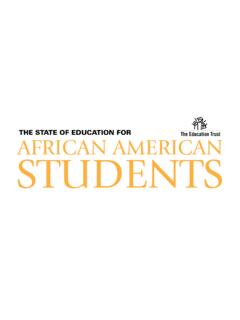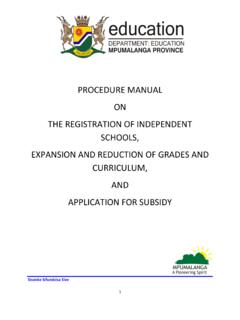Transcription of SOUTH AFRICAN SCHOOLS ACT 84 OF 1996 - GDE Admissions
1 Copyright Juta & Company LimitedSOUTH AFRICAN SCHOOLS ACT 84 OF 1996[ASSENTED TO 6 NOVEMBER 1996][DATE OF COMMENCEMENT: 1 JANUARY 1997](English text signed by the President)as amended byEducation Laws Amendment Act 100 of 1997 Education Laws Amendment Act 48 of 1999 Education Laws Amendment Act 53 of 2000 Education Laws Amendment Act 57 of 2001 Education Laws Amendment Act 50 of 2002 Education Laws Amendment Act 1 of 2004 Education Laws Amendment Act 24 of 2005 Education Laws Amendment Act 31 of 2007 Basic Education Laws Amendment Act 15 of 2011 Regulations under this ActACTTo provide for a uniform system for the organisation, governance and fundingof SCHOOLS ; to amend and repeal certain laws relating to SCHOOLS ; and to providefor matters connected the achievement of democracy in SOUTH Africa has consigned to history thepast system of education which was based on racial inequality and segregation; andWHEREAS this country requires a new national system for SCHOOLS which will redresspast injustices in educational provision, provide an education of progressively highquality for all learners and in so doing lay a strong foundation for the development of allour people's talents and capabilities, advance the democratic transformation of society,combat racism and sexism and all other forms of unfair discrimination and intolerance,contribute to the eradication of poverty and the economic well-being of society, protectand advance our diverse cultures and languages, uphold the rights of all learners,parents and educators, and promote their acceptance of responsibility for theorganisation, governance and funding of SCHOOLS in partnership with the State; andWHEREAS it is necessary to set uniform norms and standards for the education oflearners at SCHOOLS and the organisation, governance and funding of SCHOOLS throughoutthe Republic of SOUTH Africa.
2 BE IT THEREFORE ENACTED by the Parliament of the Republic of SOUTH Africa, asfollows:-CHAPTER 1 DEFINITIONS AND APPLICATION OF ACT (ss 1-2)1 DefinitionsCopyright Juta & Company Limited(1) In this Act, unless the context indicates otherwise-'Constitution' means the Constitution of the Republic of SOUTH Africa, 1996 (Act108 of 1996);[Definition of 'Constitution' substituted by s. 1 (b) of Act 100 of 1997.]'Council of Education Ministers' means the Council of Education Ministersestablished by the National Education Policy Act, 1996 (Act 27 of 1996);'dangerous object' means- (a) any explosive material or device; (b) any firearm or gas weapon; (c) any article, object or instrument that may be employed to cause bodily harmto a person or damage to property, or to render a person temporarilyparalysed or unconscious; or (d) any object that the Minister may, by notice in the Gazette, declare to be adangerous object for the purpose of this Act;[Definition of 'dangerous object' inserted by s.]
3 4 (a) of Act 31 of 2007.]'education department' means the department established by section 7 (2) ofthe Public Service Act, 1994 (Proclamation 103 of 1994), which is responsible foreducation in a province;'educator' means any person, excluding a person who is appointed to exclusivelyperform extracurricular duties, who teaches, educates or trains other persons or whoprovides professional educational services, including professional therapy andeducation psychological services, at a school ;[Definition of 'educator' substituted by s. 6 (a) of Act 48 of 1999.]'governing body' means a governing body contemplated in section 16 (1);'grade' means that part of an educational programme which a learner maycomplete in one school year, or any other education programme which the Member ofthe Executive Council may deem to be equivalent thereto;'Head of Department' means the head of an education department;'illegal drug' means- (a) any unlawful substance that has a psychological or physiological effect; or (b) any substance having such effect that is possessed unlawfully;[Definition of 'illegal drug' inserted by s.
4 4 (b) of Act 31 of 2007.]'independent school ' means a school registered or deemed to be registered interms of section 46;'learner' means any person receiving education or obliged to receive education interms of this Act;'loan' means any financial obligation based on agreement, which obligationrenders a school liable for making payment, in one or more instalments, in favour ofany person, but does not include the payment of staff appointed by the governingbody in terms of section 20 (4) or (5);[Definition of 'loan' inserted by s. 4 (a) of Act 15 of 2011.]'member of staff' means a person employed at a school ;'Member of the Executive Council' means the Member of the Executive Councilof a province who is responsible for education in that province;'Minister' means the Minister of Basic Education;Copyright Juta & Company Limited[Definition of 'Minister' substituted by s. 4 (b) of Act 15 of 2011.]'no fee threshold' means the level of funding per learner contemplated in thenorms and standards for school funding applicable to a public school which enablesthe Minister to declare a school a no fee school in terms of this Act;[Definition of 'no fee threshold' inserted by s.
5 1 (a) of Act 24 of 2005.]'norms and standards for school funding' means the national norms andstandards for the funding of SCHOOLS determined by the Minister in terms of section35;[Definition of 'norms and standards for school funding' inserted by s. 1 (a) of Act 24 of 2005.]'officer' means an employee of an education department appointed in terms ofthe Educators Employment Act, 1994 (Proclamation 138 of 1994), or the PublicService Act, 1994 (Proclamation 103 of 1994);'parent' means- (a) the biological or adoptive parent or legal guardian of a learner;[Para. (a) substituted by s. 4 (c) of Act 15 of 2011.] (b) the person legally entitled to custody of a learner; or (c) the person who undertakes to fulfil the obligations of a person referred to inparagraphs (a) and (b) towards the learner's education at school ;'principal' means an educator appointed or acting as the head of a school ; 'province' means a province established by section 124 of the Constitution;'provincial legislature' means a provincial legislature contemplated in section125 of the Constitution;'public school ' means a school contemplated in Chapter 3;'Registrar of deeds' means the registrar of deeds referred to in section 2 of theDeeds Registries Act, 1937 (Act 47 of 1937);[Definition of 'Registrar of deeds' inserted by s.
6 1 (a) of Act 100 of 1997.]' school ' means a public school or an independent school which enrols learners inone or more grades from grade R (Reception) to grade twelve;[Definition of ' school ' substituted by s. 1 (c) of Act 100 of 1997 and by s. 6 (b) of Act 48 of1999.]' school activity' means any official educational, cultural, recreational or socialactivity of the school within or outside the school premises;[Definition of ' school activity' inserted by s. 4 (c) of Act 31 of 2007.]' school fees' means school fees contemplated in section 39 and includes any formof contribution of a monetary nature made or paid by a person or body in relation tothe attendance or participation by a learner in any programme of a public school ;[Definition of ' school fees' inserted by s. 1 (b) of Act 24 of 2005.]'this Act' means this Act and all regulations promulgated under this Act.(2) Footnotes appearing in this Act must not be used in the interpretation of anyprovision of this Act.[Sub-s.
7 (2) added by s. 1 of Act 50 of 2002.]2 Application of Act(1) This Act applies to school education in the Republic of SOUTH Africa.(2) A Member of the Executive Council and a Head of Department must exercise anyCopyright Juta & Company Limitedpower conferred upon them by or under this Act, after taking full account of theapplicable policy determined in terms of the National Education Policy Act, 1996 (Act 27of 1996).(3) Nothing in this Act prevents a provincial legislature from enacting legislation forschool education in a province in accordance with the Constitution and this Act.[Sub-s. (3) amended by s. 2 of Act 100 of 1997.]CHAPTER 2 LEARNERS (ss 3-11)3 Compulsory attendance(1) Subject to this Act and any applicable provincial law, every parent must causeevery learner for whom he or she is responsible to attend a school from the first schoolday of the year in which such learner reaches the age of seven years until the last schoolday of the year in which such learner reaches the age of fifteen years or the ninth grade,whichever occurs first.
8 (2) The Minister must, by notice in the Government Gazette, determine the ages ofcompulsory attendance at school for learners with special education needs.(3) Every Member of the Executive Council must ensure that there are enough schoolplaces so that every child who lives in his or her province can attend school as requiredby subsections (1) and (2).(4) If a Member of the Executive Council cannot comply with subsection (3) becauseof a lack of capacity existing at the date of commencement of this Act, he or she musttake steps to remedy any such lack of capacity as soon as possible and must make anannual report to the Minister on the progress achieved in doing so.(5) If a learner who is subject to compulsory attendance in terms of subsection (1) isnot enrolled at or fails to attend a school , the Head of Department may- (a) investigate the circumstances of the learner's absence from school ; (b) take appropriate measures to remedy the situation; and (c) failing such a remedy, issue a written notice to the parent of the learnerrequiring compliance with subsection (1).
9 (6) Subject to this Act and any other applicable law- (a) any parent who, without just cause and after a written notice from the Headof Department, fails to comply with subsection (1), is guilty of an offence andliable on conviction to a fine or to imprisonment for a period not exceedingsix months; or (b) any other person who, without just cause, prevents a learner who is subjectto compulsory attendance from attending a school , is guilty of an offence andliable on conviction to a fine or to imprisonment for a period not exceedingsix Exemption from compulsory attendance(1) A Head of Department may exempt a learner entirely, partially or conditionallyfrom compulsory school attendance if it is in the best interests of the Juta & Company Limited(2) Every Head of Department must maintain a register of all learners exempted fromcompulsory school Admission to public SCHOOLS (1) A public school must admit learners and serve their educational requirementswithout unfairly discriminating in any way.
10 (2) The governing body of a public school may not administer any test related to theadmission of a learner to a public school , or direct or authorise the principal of the schoolor any other person to administer such test.(3) No learner may be refused admission to a public school on the grounds that his orher parent- (a) is unable to pay or has not paid the school fees determined by the governingbody under section 39; (b) does not subscribe to the mission statement of the school ; or (c) has refused to enter into a contract in terms of which the parent waives anyclaim for damages arising out of the education of the learner.(4) (a) The admission age of a learner to a public school to- (i) grade R is age four turning five by 30 June in the year of admission; (ii) grade 1 is age five turning six by 30 June in the year of admission.(b) Subject to the availability of suitable school places and other educationalresources, the Head of Department may admit a learner who- (i) is under the age contemplated in paragraph (a) if good cause is shown; and (ii) complies with the criteria contemplated in paragraph (c).









